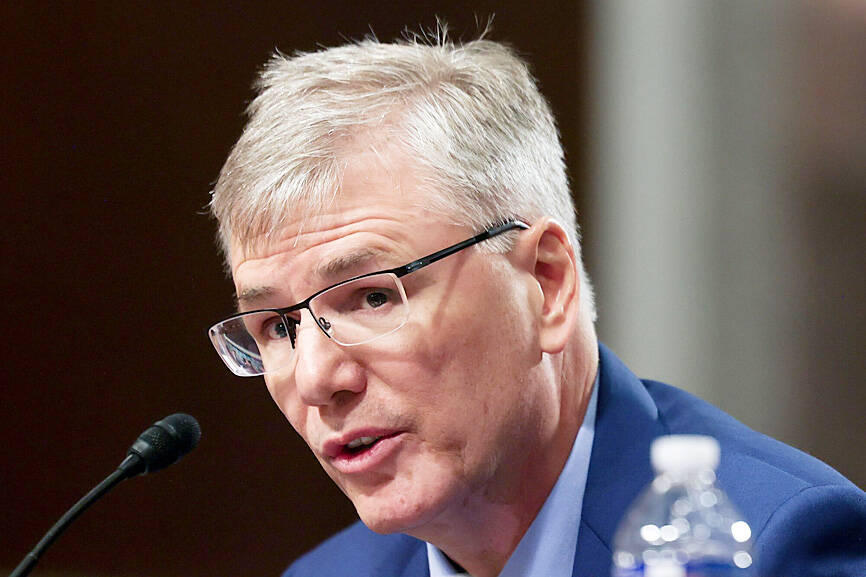US National Reconnaissance Office Deputy Director Troy Meink, who has been nominated by US President Donald Trump to serve as secretary of the US Air Force (USAF), on Thursday emphasized the importance of uncrewed systems in deterring conflicts across the Taiwan Strait.
During his nomination hearing at the US Senate Armed Services Committee, Meink described the Taiwan Strait as a highly contested and sensitive region, warning that the potential for Chinese military action against Taiwan remains a serious threat to regional and global stability.
“Unmanned systems play a critical role in deterring conflict in the region, but the systems’ effectiveness depends on addressing the challenges and limitations associated with their use,” Meink said.

Photo: Bloomberg
Meink proposed a comprehensive strategy for the US, including the development of advanced uncrewed systems, enhanced command and control, improved cybersecurity and resilience, and integration of uncrewed systems with other warfighting capabilities to fully leverage their potential.
Meink said that threats from the Chinese People’s Liberation Army Rocket Force to USAF personnel and facilities are increasing, driven by the growing number, variety, range and sophistication of missiles China produces each year.
Although the USAF has made progress in addressing the Chinese missile threat, there is more to be done, he said.
Meink said he believes China poses the largest military threat to the US and its allies in the Indo-Pacific region, as Beijing has spent the past two decades studying Washington, which focused primarily on countering violent extremism during the same period.
China has “used that time to modernize and attempt to catch up in terms of both capability and capacity,” Meink said.
“Their aggressive behavior in places like the South China Sea conspicuously demonstrates a willingness to use military hard power to achieve their national security objectives,” he added.
Meink said that his top concern is the timeline of China’s military development, adding that if the US cannot shorten its development timelines, Beijing would likely continue closing the gap with Washington.
The Washington Times on Thursday reported that if a war breaks out across the Taiwan Strait, the US outpost of Guam would likely become a major target of Chinese missiles.
When asked about Guam’s role in a potential conflict with China, Meink said that the US territory is a critical location, enabling the projection and sustainment of air power from the front lines of the Indo-Pacific region to bolster the USAF’s posture west of the International Date Line.
“My understanding is that significant infrastructure improvements have already been made at Andersen [USAF Base in Guam], but further enhancements including ongoing upgrades to its airfields, increasing support facilities, and expanding fuel and munitions storage capacity are vital to ensure robust resiliency and operational continuity in contested environments,” Meink said.
Defense News reported that Meink, who joined the USAF in 1988, is a US Department of Defense insider with “deep acquisition and technology-development experience.”

The Ministry of Economic Affairs has fined Taobao NT$1.2 million (US$36,912) for advertisements that exceed its approved business scope, requiring the Chinese e-commerce platform to make corrections in the first half of this year or its license may be revoked. Lawmakers have called for stricter enforcement of Chinese e-commerce platforms and measures to prevent China from laundering its goods through Taiwan in response to US President Donald Trump’s heavy tariffs on China. The Legislative Yuan’s Finance Committee met today to discuss policies to prevent China from dumping goods in Taiwan, inviting government agencies to report. Democratic Progressive Party Legislator Kuo Kuo-wen (郭國文) said

The Ministry of Economic Affairs has fined Taobao NT$1.2 million (US$36,900) for advertisements that exceeded its approved business scope and ordered the Chinese e-commerce platform to make corrections in the first half of this year or its license would be revoked. Lawmakers have called for stricter supervision of Chinese e-commerce platforms and more stringent measures to prevent China from laundering its goods through Taiwan as US President Donald Trump’s administration cracks down on origin laundering. The legislature’s Finance Committee yesterday met to discuss policies to prevent China from dumping goods in Taiwan, inviting government agencies to report on the matter. Democratic Progressive Party

Taiwan and its Pacific ally Tuvalu on Tuesday signed two accords aimed at facilitating bilateral cooperation on labor affairs, according to Taiwan’s Ministry of Foreign Affairs (MOFA). The governments inked two agreements in Taipei, witnessed by Foreign Minister Lin Chia-lung (林佳龍) and visiting Deputy Tuvaluan Prime Minister Panapasi Nelesone, MOFA said in a news release. According to MOFA, the agreements will facilitate cooperation on labor issues and allow the two sides to mutually recognize seafarers’ certificates and related training. Taiwan would also continue to collaborate with Tuvalu across various fields to promote economic prosperity as well as the well-being of their

Sung Chien-liang (宋建樑), who led efforts to recall Democratic Progressive Party (DPP) Legislator Lee Kun-cheng (李坤城), was released on bail of NT$80,000 today amid outcry over his decision to wear a Nazi armband to questioning the night before. Sung arrived at the New Taipei District Prosecutors’ Office for questioning in a recall petition forgery case last night wearing a red armband bearing a swastika, carrying a copy of Adolf Hitler’s Mein Kampf and giving a Nazi salute. Sung left the building at 1:15am without the armband and covering the book with his coat. Lee said today that this is a serious